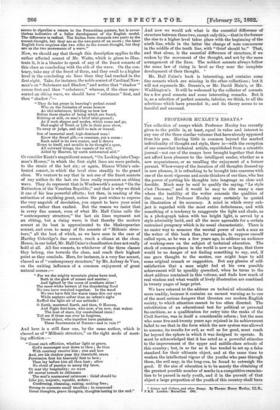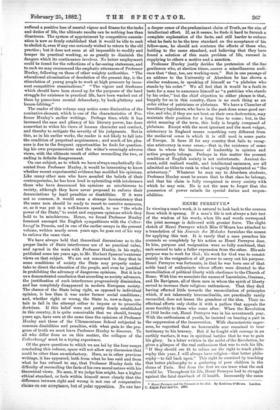PROFESSOR HUXLEY'S ESSAYS.*
THE collection of essays which Professor Huxley has recently given to the public is, at least, equal in value and interest to any one of the three similar volumes that have already appeared from his pen. Having little in common beyond the marked individuality of thought and style, there is—with the exception of one somewhat technical article, republished from a scientific journal—not one of the essays here brought together that does not afford keen pleasure to the intelligent reader, whether as a new acquaintance, or as recalling the enjoyment of a former perusal. When•weary of the iteration of old thoughts dressed up in new phrases, it is refreshing to be brought into converse with one of the most vigorous and acute thinkers of our time, who has the power of patting his thoughts into language so clear and forcible. Much may be said to qualify the saying, "Le style c'est rhomme," and it would be easy to cite many a case where the inability of the writer conceals the qualities of the man ; but Professor Huxley may certainly be quoted in illustration of its accuracy. A mind in which every sub- ject is regarded with the most entire definiteness, and with something of a tendency to exaggerate the light and shade, as in a photograph taken with too bright light, is served by a style admirably lucid, and all the more agreeable for a certain restrained pungency which is its usual characteristic. There is no easier way to measure the mental power of such a man as the writer of this book than, for example, to suppose oneself called upon, as he was a few years ago, to address an audience of working-men on the subject of technical education. The stock of common-places in the world is now so large, that there would be no danger of not finding something to say, and, if one gave thought to the matter, one might hope to add some original remark or suggestion. But any gleams of self- satisfaction that a man might feel at his own possible achievement will be speedily quenched, when he turns to the short address contained in this volume, and finds how much of real wisdom and what wealth of lively illustration are combined in twenty pages of large print.
We have referred to the address on technical education the more readily, because it contains an earnest warning as to one of the most serious dangers that threaten our modern English society, to which attention cannot be too often directed. The substitution of an educational test for political or personal fas ouritism, as a qualification for entry into the ranks of the Civil Service, was in-itself a considerable reform ; but the men who some five-and-twenty years ago rejoiced in its achievement failed to see that in the form which the new system was allowed to assume, its results for evil, as well as for good, must reach far beyond the sphere in which it was designed to operate. It must be acknowledged that it has acted as a powerful stimulus to the improvement of the upper and middle-class schools of this country; but, in so far as it has tended to set up a false standard for their ultimate object, and at the same time to weaken the intellectual vigour of the youths who pass through them, the evil may, in the long-run, be found to outweigh the good. If the aim of education is to be merely the obtaining of the greatest possible number of marks in a competitive examina- tion to be passed in early youth, and if in the pursuit of that object a large proportion of the youth of this country shall have • Science and Culture, and other Essays. By Thomas Henry Huxley, LL.D., F.R.8. London : Macmillan. 1881. suffered a positive loss of mental vigour and fitness for the tasks and duties of life, the ultimate results can be nothing less than disastrous. The system of appointment by competitive examin- ation is now so firmly established that it would be idle to seek to abolish it, even if any one seriously wished to return to the old practice ; but it does not seem at all impossible to modify and temper its practical working, so as greatly to diminish the dangers which its continuance involves. No better employment could be found for the reflections of a far-seeing statesman, and to such we may recommend the emphatic utterances of Professor Huxley, following on those of other weighty authorities. "The educational abomination of desolation of the present day, is the stimulation of young people to work at high pressure by inces- sant competitive examinations." " The vigour and freshness which should have been stored up for the purposes of the hard struggle for existence in practical life, have been washed out of them by precocious mental debauchery, by book-gluttony and lesson-bibbing."
The reader of this volume may notice some diminution of the combative element, which is one of the characteristics of Pro- fessor Huxley's earlier writings. Perhaps time, while it has increased the ease and pliancy of his literary power, has done somewhat to widen his views of human character and conduct, and thereby to mitigate the severity of his judgments. Bain this, as in his earlier works, the reader is not likely to fall into the condition of perpetual acquiescence ; and much of his plea. sure is due to the frequent opportunities he finds for question- ing his own prepossessions and the writer's seemingly adverse views, with the ultimate result of either reconciling the two, or ending in definite disagreement.
On one subject, as to which we have always emphatically dis- sented from Professor Huxley, it would be interesting to know whether recent experimental evidence has modified his opinions. Like many other men who have assailed the beliefs of their
• contemporaries, he has been loud in upbraiding with intolerance those who have denounced his opinions as mischievous to society, although they have never proposed to enforce their denunciations by legal penalties or disabilities. If it were not so common, it would seem a strange inconsistency that the same men should be ready to resort to coercive measures, or, as it was put in a well-known speech, to use "the whole power of the State," to resist and suppress opinions which they hold to be mischievous. Hence, we found Professor Huxley foremost amongst the English sympathisers with the Cultur- kampf in Prussia, and in one of the earlier essays in the present volume, written nearly seven years ago, he goes out of his way to enforce the same view.
We have always held that theoretical discussions as to the proper limits of State interference are of no practical value, and agreed in the main with Professor Huxley, in his reply, published some ten years ago, to Mr. Herbert Spencer's extreme views on that subject. We are not concerned to deny that in some conditions of society the State may properly under- take to direct the education of the people, and even be justified in prohibiting the advocacy of dangerous opinions. But it is to us a demonstrated conclusion that according as society advances, the justification of such interference progressively diminishes. and has completely disappeared in modern European society. The chance of the State being right, as opposed to individual opinion, is less than it was under former social conditions ; and, whether right or wrong, the State is, now-a-days, cer- tain to fail in the attempt either to impose or to proscribe doctrines. If this belief were not pretty firmly established in this country, it is quite conceivable that we should, twenty years ago, have seen at the same time the opinions of Professor Huxley and those of the Ultramontane School subjected to common disabilities and penalties, with what gain to the pro- gress of truth we must leave Professor Huxley to discover. To all who differ from us on this matter, the collapse of the Culturkampf must be a trying experience.
Of the grave questions to which we are led by the four essays concluding this volume, space will not allow any discussion that could be other than unsatisfactory. Here, as in other previous writings, it has appeared, both from what he has said and from what he has refused to say, that Professor Huxley feels the difficulty of reconciling the facts of his own moral nature with his theoretical views. No man, if we judge him aright, has a higher ethical standard, or feels within himself more clearly that the difference between right and wrong is not one of comparative claims on our acceptance, but of polar opposition. No one has
a deeper sense of the predominant claim of Truth, as the aim of intellectual effort. If, as it seems, he finds it hard to furnish a complete explanation of the facts, and still harder to enforce what he feels to be the true standard on the acceptance of his fellow-men, he should not contemn the efforts of those who, holding to the same standard, and believing that they have found a solution of this main problem of life, succeed in supplying to others a motive and a sanction.
Professor Huxley justly derides the pretension of the fine gentlemen who, at election times, assure a miscellaneous audi- ence that "they, too, are working-men." But in one passage of an address to the University of Aberdeen he has shown a similar weakness, in speaking of himself as "a plebeian who stands by his order." We all feel that it would be a fault in• taste for a man to announce himself as "a patrician who stands. by his order," but the chief objection to either phrase is that, happily for us in this country, there is no such thing as an order either of patricians or plebeians. We have a Chamber of hereditary legislators, who have in the past done some good ser- vice, and who, if they are not bent on their own destruction, may maintain their position for a long time to come ; but, in the strict meaning of the term, this body is largely composed of plebeians. Except with the most ignorant and the most vulgar,. aristocracy in England means something very different from the mediaeval sense in which it is still used in some parts of Europe. It fares ill for any country that fails to recog- nise aristocracy in some sense,—that is, the existence of some class to whom the business of leadership in opinion and action properly belongs. Perhaps in this matter the present condition of English society is not unfortunate. Ancient de- scent, solid realised wealth, and intellectual eminence, are all admitted as titles to rank in what is vaguely designated as " the aristocracy." Whatever he may say to Aberdeen students,. Professor Huxley must be aware that to that class he belongs,. and that his claim is fully recognised in every society with which he may mix. He is not the man to forget that the possession of power entails its special duties and respon- sibilities.



































 Previous page
Previous page